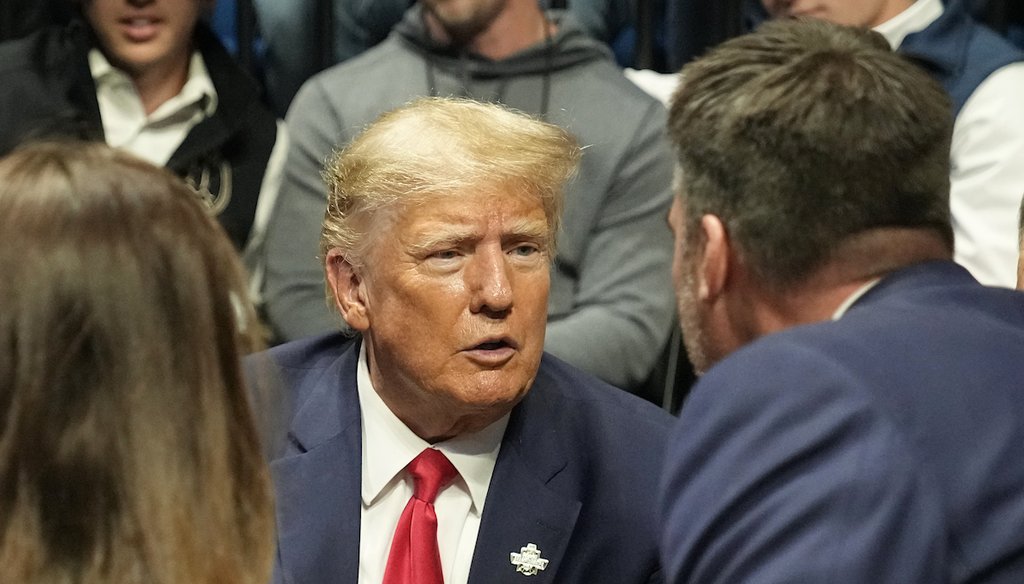Stand up for the facts!
Our only agenda is to publish the truth so you can be an informed participant in democracy.
We need your help.
I would like to contribute

Former President Donald J. Trump talks March 18, 2023, with Oklahoma Gov. Kevin Stitt, right, at the NCAA Wrestling Championships in Tulsa, Okla. (AP)
As Donald Trump looks ahead to possible charges related to hush payments to adult entertainment star Stormy Daniels, the former president has preemptively arguing his innocence.
Reporting initially published by The New York Times suggested that Manhattan District Attorney Alvin L. Bragg is close to filing charges for the alleged concealment of a $130,000 hush money payment to Daniels by Michael Cohen, Trump's then-lawyer, shortly before the 2016 presidential election.
In one Feb. 20 post on his Truth Social platform, Trump wrote that the Federal Election Commission "dropped the ‘Horseface’ Daniels Fake Witch Hunt, because they found no evidence of problems" and added that "the statute of limitations also stops them cold from going forward."
When we took a closer look at these arguments, we found that his assertions were misleading.
We emailed Trump’s campaign spokesperson and got no response by our deadline.
This characterization of the commission’s actions is wrong, though it’s hard to know how the complaint would have been decided had it gone to a full adjudication.
The comment refers to several related commission complaints brought against Michael Cohen, the Trump lawyer who handled the payoff to Daniels; Trump; Trump’s campaign; and a few other individuals and entities. The complaints alleged that Cohen, Trump, and others violated the Federal Election Campaign Act of 1971 at Trump’s direction in order to influence the 2016 election.
When it looked at the complaints, the commission’s office of general counsel determined that there was reason to believe that the contributions were illegal and improperly went unreported.
However, in 2021, the FEC dropped its inquiry when it could not reach the majority required for deciding the case. The commission, which is set up to have an equal number of Democrats and Republicans, often deadlocks along partisan lines when it considers controversial cases. (In this case, the FEC was down from six commissioners to four, since one was absent for the vote and one opted to recuse.)
On one question in the case, the two Democratic commissioners who participated found common ground with the two Republican commissioners: They agreed that the complaint against Cohen should be dismissed, because Cohen had by that time admitted to a crime in federal court, making any commission action against him moot.
But the Democratic and Republican commissioners were divided in how to proceed on the complaints against Trump and the entities related to him.
The Democratic commissioners, Shana M. Broussard and Ellen L. Weintraub, argued that the charges against Trump — that he "knowingly and willfully accepted contributions nearly 5,000% over the legal limit to suppress a negative story mere days before Election Day" — were "well-grounded."
The Republican commissioners, Sean J. Cooksey and James E. Trainor III, didn’t address the charges’ validity, but instead argued that Cohen’s guilty plea in federal court made the public record "complete." This, they argued, made moot any actions by the commission, including action against Trump.
"We concluded that pursuing these matters further was not the best use of agency resources," Cooksey and Trainor wrote. "The commission regularly dismisses matters where other government agencies have already adequately enforced and vindicated the commission’s interests. Furthermore, by the time (the general counsel’s) recommendations came before us, the commission was facing an extensive enforcement docket backlog resulting from a prolonged lack of a quorum."
The Republican commissioners’ statement did not say the commission was clearing Trump of wrongdoing in the matter. And even if the Republican commissioners had said that, they would not have been able to make that the commission’s final ruling; that view was firmly opposed by the two Democrats.
"The Republican FEC commissioners’ statement is phrased using classic ‘use of resources’ declination language familiar to prosecutors, where despite the presence of significant evidence, they don’t see a case as important enough, relative to others, to merit going forward," said Mark Osler, a University of St. Thomas law professor.
Brett G. Kappel, a campaign finance law specialist at the firm Harmon Curran, agreed. "Trump is simply wrong," Kappel said.
Whether the commission could have found Trump ultimately at fault in the case is unknowable, but it’s not a slam dunk, said Stanley Brand, a distinguished fellow in law and government at Penn State Dickinson Law. The specifics of the case suggest that "the FEC would be venturing into uncharted territory," Brand said.
Whether this is true or not is unknowable until any specific charges against Trump have been made public. There’s reason to doubt Trump could be saved by the statute of limitations, experts said.
One possible charge floated by legal experts could be "falsifying business records in the first degree," which is a felony under New York state law. This could have a statute of limitations of up to five years.
Cohen paid Daniels in October 2016, which is about six and a half years ago, which would be past the statute of limitations.
But there’s a catch.
Trump formally changed his residency from New York to Florida in October 2019, and the district attorney’s office may argue that this would "toll," or stop the clock on, New York’s statute of limitations, The Associated Press reported.
Stopping the clock for this or other reasons is a credible argument, Brand said, but "these issues are often litigated, so it’s hard to say how the statute of limitations would figure in this case."
PolitiFact staff writer Amy Sherman contributed to this report.
RELATED: Q&A: Can Trump run for president if indicted in Stormy Daniels case? What happens if he's arrested?
RELATED: All of our fact-checks of Trump on the Truth-O-Meter
Our Sources
Donald Trump, post on Truth Social, Feb. 20, 2023
Federal Election Commission, statement by Shana M. Broussard and Ellen L. Weintraub, May 6, 2021
Federal Election Commission, statement by Sean J. Cooksey and James E. Trainor III, April 26. 2021
New York State, "Section 175.05: Falsifying business records in the second degree," accessed March 21, 2023
Just Security, "Survey of Past New York Felony Prosecutions for Falsifying Business Records," March 21, 2023
NBC News, "How Trump could be indicted: What to know about the hush money case," March 20, 2023
New York Times, "Trump, Lifelong New Yorker, Declares Himself a Resident of Florida," Oct. 31, 2019
CNN, "Trump says he expects to be arrested Tuesday as New York law enforcement prepares for possible indictment," March 19, 2023
New York Times, "Inside the Payoff to a Porn Star That Could Lead to Trump’s Indictment," March 19, 2023
Associated Press, "The New York hush-money probe of Donald Trump explained," March 10, 2023
Email interview with Stanley Brand, distinguished fellow in law and government at Penn State Dickinson Law, March 21, 2023
Email interview with Brett G. Kappel, specialist in campaign finance law at the firm Harmon Curran, March 21, 2023
Email interview with Mark Osler, University of St. Thomas law professor, March 21, 2023




































